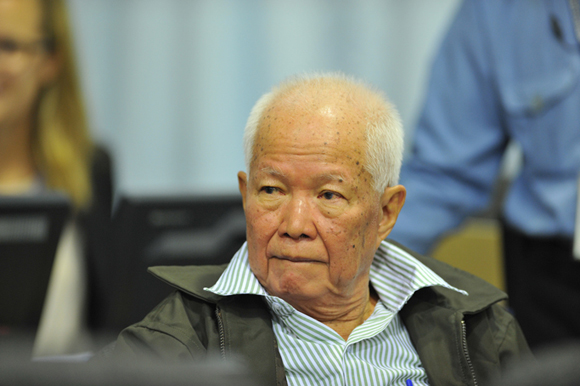Critics say political interference and judicial misconduct are tarnishing the UN-backed Khmer Rouge trial, seen as key to justice more than 30 years after the brutal regime was ousted.

In this photo released by Extraordinary Chambers in the Courts of Cambodia, Khieu Samphan, former Khmer Rouge head of state, listens during a trial for former Khmer Rouge top leaders, in Phnom Penh, Cambodia, Nov. 21. (Mark Peters/ECCC)
PHNOM PENH, Cambodia–A UN-backed war-crimes tribunal in Cambodia today began historic proceedings in its second case against three surviving leaders of the Khmer Rouge accused of orchestrating Cambodia’s killing fields in the late 1970s.
Hundreds of students, regime survivors, and saffron-robed monks packed a courtroom in the capital to hear prosecutors outline a litany of accusations against the elderly defendants, who face charges including war crimes, genocide, and crimes against humanity.
But more than 30 years after the brutal communist movement was ousted from power, the trial – once seen as a key step on the road to justice and reconciliation – threatens to be overshadowed by claims of political interference and judicial misconduct.
On trial are Nuon Chea, the regime’s chief ideologue, former foreign minister Ieng Sary, and head of state Khieu Samphan, all octogenarians. Beginning with the forcible evacuation of Phnom Penh on April 17, 1975, the trio are accused of presiding over an agrarian revolution that turned Cambodia into an open air prison from 1975-79 and led to the death of an estimated 1.7 million Cambodians from execution, starvation, and overwork.
“These crimes, ordered and orchestrated by the accused, are among the worst horrors inflicted upon any nation in modern history,” co-prosecutor Chea Leang told the court.
A fourth defendant, however, was notably absent from today’s hearing. Judges ruled last week that Ieng Thirith, the former Khmer Rouge minister of social affairs, was unfit to stand trial, recommending that she be released. Court-appointed medical experts testified last month that the sister-in-law of the regime’s supreme leader, Pol Pot, and the most powerful woman in the Khmer Rouge government would be unable to follow the trial proceedings.
Prosecutors have appealed the ruling, and Youk Chhang, director of the Documentation Center of Cambodia, which researches Khmer Rouge crimes, said it would be “difficult medicine to swallow” for many Cambodians if Ieng Thirith is released. Yoy Chieng, a regime survivor who attended today’s hearing, believes it was a ploy to evade justice. “If the court releases Ieng Thirith, the other three might pretend they have some mental problems as well,” she says.
Race against the clock …
The ruling only underscores the urgency of trying the remaining defendants, who many fear may not live to see the end of the complex trial. Pol Pot, the Khmer Rouge’s supreme leader, died in 1998 at a jungle camp along the Thai border, and the tribunal has managed just one conviction since 2006: that of former schoolteacher Kaing Guek Eav – better known as Comrade Duch – who was sentenced to 30 years jail last year for heading the grisly S-21 prison and torture center in Phnom Penh.
As well as racing against the clock, the court is battling mounting claims of political interference, judicial misconduct, and violations of victims’ rights by some court staff. Critics say judges deliberately botched an investigation into a potential third case under political pressure from the Cambodian government, which publicly opposes additional prosecutions.
In October, German co-investigating judge Siegfried Blunk resigned, claiming that public government opposition to future prosecutions had undermined the tribunal’s perceived independence, prompting calls for the UN to take a stronger stand.
“We would like to see the UN trying to put an end to this now,” says Clair Duffy, a court monitor with the Open Society Justice Initiative, which has called for a panel of independent experts to probe the allegations. Inaction risked tainting the court’s past and future achievements. “There’s too much history to this for them to just push ahead,” Ms. Duffy says.
How Cambodians see it
Theary Seng, a prominent regime survivor and victims advocate, last week withdrew her status as a civil party to the trial, saying it had become a “farce” and that it was time for the UN to pull the plug. “The magnitude of it is no longer acceptable,” she said.
But for some Khmer Rouge survivors, seeing their former tormentors in the dock after three decades has been worth the wait. Khem Vuthy lost seven members of her immediate family during the regime, and recalled being forced to eat cockroaches and lizards in order to survive at a rural labor camp. “I’ve heard a lot of the problems at the court, but I believe the court will bring justice,” she says. “I’ve been waiting a long time.”
[Published by the Christian Science Monitor, November 21, 2011]


